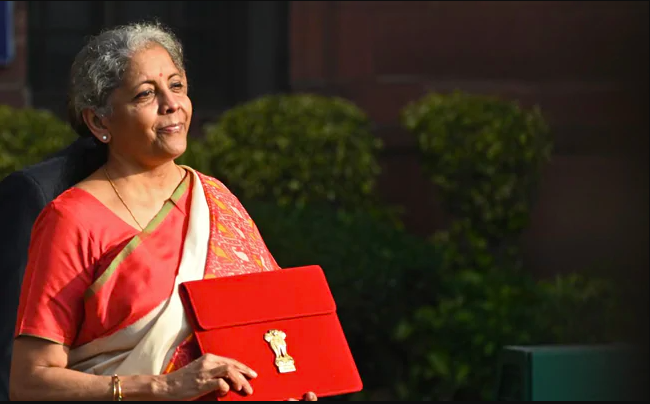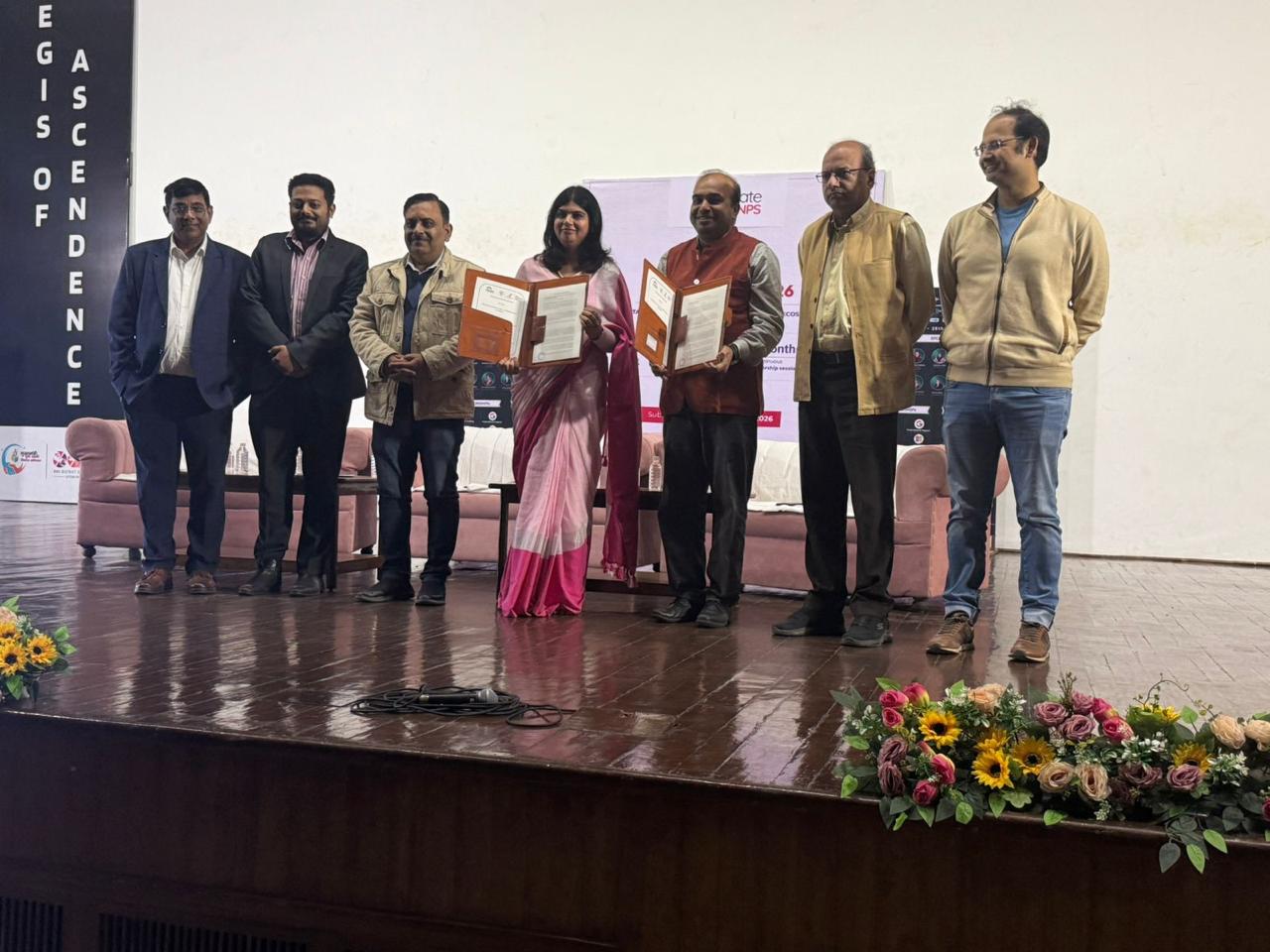
News Delhi: The Budget 2025 offers a balanced approach, aiming to boost both industry growth and provide relief to the general public. For industries, the government has unveiled the National Manufacturing Mission to promote clean technologies, particularly in electric vehicle batteries and solar panels, positioning India as a leader in renewable energy. The focus on scaling up battery storage, a crucial factor for expanding solar energy adoption, is a major step forward. Additional incentives for domestic manufacturing, particularly in sectors like electric vehicles, will further support the industry. The ₹1 lakh crore Urban Challenge Fund will enhance infrastructure development in urban areas, while initiatives like skill development centers and the establishment of Global Capability Centers in Tier 2 cities will strengthen talent and industry collaboration.
For the common people, the Budget brings notable benefits. The income tax exemption limit has been raised to ₹12 lakh, meaning individuals with income up to this amount will not face any tax burden. The loan limit for Kisan Credit Cards (KCC) has been increased from ₹3 lakh to ₹5 lakh, providing farmers with additional financial support. In the healthcare sector, 10,000 new medical college seats will be added, and daycare cancer centers will be set up in district hospitals. The government has also provided relief for electric vehicles by reducing customs duties on lithium-ion batteries, making them more affordable. Additionally, financial aid will be available for women and marginalized communities to start their own businesses. Overall, the Budget focuses on critical areas like infrastructure, healthcare, education, and clean energy, aiming for inclusive and sustainable growth that benefits both industries and ordinary citizens.
Industry leaders and experts express their opinions on Budget 2025-26:
Mr Yateesh Wahaal, Director M3M India “We commend Finance Minister Nirmala Sitharaman for presenting a visionary Budget 2025 that prioritizes infrastructure development and urban expansion, particularly in Tier 2 and Tier 3 cities. The Udaan Yojana will be a game-changer, enhancing connectivity and unlocking the economic potential of emerging regions. Additionally, the national framework for Global Capability Centers in Tier 2 cities will strengthen talent availability and industry collaboration, fostering a robust investment climate. With India maintaining its position as the fastest-growing major economy, these structural reforms will accelerate real estate growth, boost private sector participation, and empower the middle class, further enhancing their spending power. M3M India remains committed to contributing to this transformative journey towards ‘Viksit Bharat.'”
Madhur Gupta, CEO, Hero Realty said – “The government’s latest budgetary allocations, particularly the ₹15,000 crore SWAMIH Fund 2, will provide a much-needed boost to the real estate sector by ensuring the completion of stalled projects and restoring homebuyer confidence. The ₹1 lakh crore Urban Challenge Fund is a transformative step toward developing future-ready cities, making them vibrant economic hubs. Additionally, the ₹1.5 lakh crore outlay for PPP infrastructure projects will enhance urban connectivity and drive demand for real estate. These measures collectively reinforce the sector’s growth trajectory and align with India’s vision of sustainable urban development.”
Mr. Manik Malik, CFO, BPTP said, “For middle-class households in India, the construction of 50,000 dwelling units under the Special Window for Mid-Income Housing and the anticipated delivery of an additional 40,000 units in 2025 represent a major milestone. By easing the combined financial strain of rent and EMIs, these initiatives help homebuyers regain their confidence. In addition, the ₹1 lakh crore Urban Challenge Fund, which has ₹10,000 crore set aside for FY 2025–2026, has the potential to turn our cities into vibrant centers of growth. Cities will become more habitable and appealing as a result of this significant investment in urban infrastructure. These programs along with additional funds given in hands of taxpayers by slashing on rates has further opened the door for sustainable urban growth and shall inspire any real estate developers.”
Gaurav K Singh, Founder and Chairman, Womeki Group said, “Since its launch in 2019, the Special Window for Mid-Income Housing Investment Fund (SWAMIH) has completed 20,557 units and aims to deliver 81,000 more homes in the next three years across tier-1 and tier-2 cities. The initiative has provided much-needed relief to middle-class families struggling with rent and EMIs, while also revitalizing the real estate market by prioritizing stalled projects. SWAMIH’s focus on accelerating project completions not only fulfills homebuyers’ dreams but also boosts the entire real estate ecosystem, increasing sales and collections. Alongside 50-year interest-free loans to states for infrastructure growth and urban reforms focused on governance and planning, SWAMIH plays a key role in building smarter, more sustainable cities. Developers, committed to on-time delivery and high-quality standards, help create a more stable and dependable housing sector for all.”
Mohit Malhotra, Founder & CEO, NeoLiv said, “A significant turning point for the real estate sector has been marked by the government’s recent announcement, with over 88 lakh homes completed, and the launch of PMAY-U 2.0 in September 2024 to assist an additional one crore households. This program is expected to boost economic growth, encourage public-private collaborations, and promote the housing industry. Developers with strong financial backing are well-positioned to support this revolutionary process by providing high-quality housing options that complement the ‘Housing for All’ national objective. This initiative, which addresses the urgent demand for housing in metropolitan and tier 2 markets, is anticipated to be well received by the people. It is expected that the government’s dedication to offering long-term housing options would improve people’s quality of life.”
Yashank Wason, Managing Director, Royal Green Realty said, “As we reflect on the Union Budget 2025 – 26, there is a renewed sense of optimism within the real estate sector. The Finance Minister’s focus on addressing stalled housing projects through initiatives such as interest – free loans amounting to Rs 1.5 lakh crore for capital expenditure and the introduction of three Public-Private Partnership model (PPP) proposals from each infrastructure ministry is commendable. This budget also aims to complete an additional 40 thousand housing units in 225, benefitting middle class families who are currently managing both EMIs for home loans and rental payments. A nationwide framework will be developed as guidance to states for promoting Global Capacity Centres (GCCs) in emerging tier 2 cities. Also, increase of the nil tax slab threshold to ₹12 lakh enhances the spending power of the middle class, making homeownership more attainable. With increased disposable income, individuals can more comfortably manage home loan EMIs, encouraging them to invest in their dream homes Overall, this budget sets the stage for sustainable growth in the real estate sector, fostering new opportunities for investors and homebuyers.”
Mr. Viren Mehta, Director, ElitePro Infra says, “We welcome the finance minister’s decisions towards the real estate sector in the Budget 2025. Under the SWAMIH program, 50,000 dwelling units and plans to drive an additional 40,000 units by 2025 have been completed. This will provide support to middle – class families facing dual housing costs and alleviating financial burden on families paying EMIs on housing loans, while also covering rent for their existing homes. For the fiscal year 2025 – 26, Rs 10,000 crore has been allocated from the Rs 1 lakh crore Urban Challenge Fund, which aims to implement projects under the themes of ‘Cities as Growth Hubs’ and ‘Creative Redevelopment of Cities’. The fund will support urban areas’ transformation into growth centers by financing up to 25% of viable urban development projects. The budget 2025 offers financial flexibility for homebuyers. It acknowledges the diverse needs of various homebuyers, offering tax relief and encouraging real estate investments. The decision aligns with the government’s broader focus on comfortable living and financial empowerment, strengthening the real estate industry.”
Ashish Agarwal, Director, AU Real estate – We welcome Finance Minister Nirmala Sitharaman’s visionary Budget 2025, which prioritizes the growth of Tier 2 and Tier 3 cities through the Udaan Yojana. This initiative will connect smaller cities with major urban centers, significantly enhancing their market value and economic potential. The proposed national framework will guide states in establishing Global Capability Centres, fostering talent availability and infrastructure development while promoting collaboration with industry. With over 1.18 crore houses sanctioned under the Pradhan Mantri Awas Yojana, and the introduction of PMAY-U 2.0 for an additional one crore households, we are confident that these measures will transform our urban landscape and drive inclusive growth across all regions.”
Varun Sharma, Founder and Managing Director, MVN Infrastructure – We wholeheartedly support Finance Minister Nirmala Sitharaman’s Budget 2025, which sets a transformative agenda for infrastructure development. The allocation of Rs 1.5 lakh crore for 50-year interest-free loans to states will significantly boost real estate market sentiment, fostering growth and stability. We anticipate improved collaboration and efficiency in infrastructure projects. These strategic investments will not only elevate urban living standards but also catalyze economic growth across the nation. As real estate developers, we are excited about the prospects this budget brings for sustainable urban development and enhanced market dynamics.”
Ashish Sharma, AVP Operations, Brahma Group , said, “We wholeheartedly support Budget 2025, which lays out a transformative vision for infrastructure development. Moreover, the allocation of Rs 1.5 lakh crore for 50-year interest-free loans to states is a game-changer for the real estate sector. This significant financial support will instill confidence, boost market sentiment, and drive growth and stability across the industry. Furthermore, we believe that this initiative will lead to improved collaboration, greater efficiency, and faster implementation of infrastructure projects. The strategic investments outlined in the budget will elevate urban living standards, create more resilient cities, and catalyze broader economic growth. Furthermore, we are excited by the opportunities this budget presents for sustainable urban development.”
Abhishek Trehan, Executive Director, Trehan Iris, said, “We welcome Budget 2025 as a transformative step towards shaping the future of urban development and infrastructure. The creation of the Urban Challenge Fund, with an allocation of ₹1 lakh crore to support ‘Cities as Growth Hubs,’ is a groundbreaking move that will fuel sustainable, inclusive growth across the nation. The big relaxation in income tax slabs, announced by Union Finance Minister Nirmala Sitharaman, will boost the power of consumption and provide a major fillip to the real estate sector, enabling investors to spend more on property buying. Additionally, the SWAMIH Fund of ₹15,000 crore will accelerate the completion of housing projects, benefiting both developers and homebuyers. Moreover, with over 1.18 crore homes already sanctioned under the Pradhan Mantri Awas Yojana, and the introduction of PMAY-U 2.0 for one crore more households, we are optimistic that these initiatives will redefine our urban landscape. Budget 2025 strikes a vital balance between growth and housing, setting the foundation for sustainable development and long-term prosperity in the real estate sector.”
Mr. Aman Sharma, Managing Director of Aarize Group, “We welcome Finance Minister Nirmala Sitharaman’s visionary Budget 2025, which prioritizes the growth of Tier 2 and Tier 3 cities through the Udaan Yojana and the National Framework for Global Capability Centers (GCCs). The framework will enhance employment generation, infrastructure, and regulatory reforms, fostering economic growth in emerging cities. Additionally, continued infrastructure investments and improved connectivity will unlock new development opportunities, making these cities attractive for businesses and investors. These progressive measures will strengthen the real estate sector and support sustainable urban expansion, positioning smaller cities as key contributors to India’s economic future.”
The Union Budget 2025-26 lays a strong foundation for India’s sustainable growth by empowering citizens, boosting industry, and prioritizing infrastructure, clean energy, and social welfare, signaling a transformative step towards a prosperous and self-reliant future.







